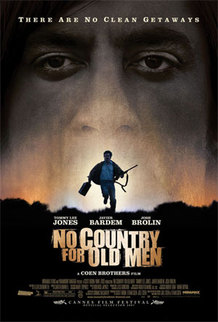
Adapting novels to film is, and has always been, a tricky business. How many times have you heard the old cliche the movie was okay, but the book was much better or the movie was good, but they left out so much whenever you speak to someone about a film adaptation about a novel you may not have read? Perhaps you have uttered such phrases yourself when you learned a person praising a film adaptation had not had the privilege of reading the novel first. Like most cliches, the comments above do contain the kernel of a fundamental truth - the book often is far superior to the film. Taking a textual narrative and all the nuances it shrouds within itself to another form of media where shrouded nuances are practically impossible to present is no simple task. In many ways, adapting a novel to film is similar to translation. And like translation, much can lost in the process.
Having said this, nothing of McCarthy's novel is lost in Ethan and Joel Coen's No Country For Old Men. Nor is anything added to sensationalize or explain or sentimentalize. The film simply, faithfully, and quite magically brings the novel to life in all its darkness and Biblical bleakness.
I remember sitting mesmerized the first time I saw the film. The vision the Coen brothers brought to the screen not only seemed to match McCarthy's vision seamlessly and faultlessly, but it also matched the visions the novel had created in my own mind when I had read it. This is no easy feat. I think the main reason why so many are disappointed by film adaptations of books has less to do with the faults and shortcomings of the films, but the simple fact that the images on the screen often do match the personal images a reader creates when they read the books. Watching an alternate vision for the book than the one you imagined is akin to looking at a good friend, a person you thought you knew very well, and realizing that person is nothing more than a stranger. In other words, it amounts to little more than a quintessential let-down.
You will suffer no such disappointment if you watch No Country For Old Men after having read No Country For Old Men. For reasons that are far too numerous for me to go into detail here, the film exists as a mirror image of book - so much so it still strikes me as eerie whenever I sit down to watch it. And if you haven't read McCarthy's novel, I would, with assured confidence, suggest you simply watch the movie. The film adaptation is so brilliant that if you are not a reader I would even go as far as to suggest you only watch the movie (banish the thought!) because watching the movie would, in essence, provide you with the same aesthetic experience as the novel. Needless to say, in the realm of film adaptations of novels, that experience is extremely rare, which is why Ethan and Joel Coen's achievement is so outstanding.


 RSS Feed
RSS Feed

